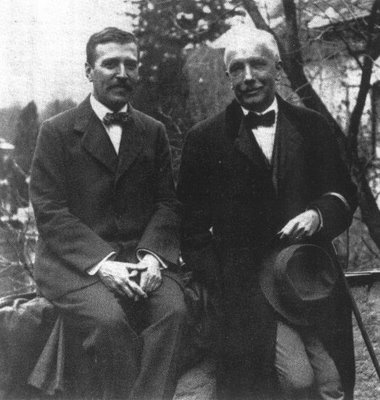 The singing is quite good, captured in decent sound for a live recording. Cheryl Studer is a vision of vocal transparency as Die Kaiserin, whose lack of a shadow for a period of twelve months means that she will be called back to her father, a spirit figure named Keikobad. The strongest performance, in terms of both acting and singing, comes from Slovenian contralto Marjana Lipovšek as Die Amme, the spirit who is the Empress's nurse. Thomas Moser is splendid as Der Kaiser, one of Strauss's better tenor roles, and Robert Hale is a convincing Barak (a role sometimes described as corresponding most to the composer), although he was near the end of his career. A young baritone named Bryn Terfel stands out as Der Geisterbote, a stripe-faced spirit from the realm of Keikobad. (This was the year that Terfel's career took off, as he also sang Jochanaan in Salome at Salzburg, across from Catherine Malfitano, and then signed a contract with Deutsche Grammophon.)
The singing is quite good, captured in decent sound for a live recording. Cheryl Studer is a vision of vocal transparency as Die Kaiserin, whose lack of a shadow for a period of twelve months means that she will be called back to her father, a spirit figure named Keikobad. The strongest performance, in terms of both acting and singing, comes from Slovenian contralto Marjana Lipovšek as Die Amme, the spirit who is the Empress's nurse. Thomas Moser is splendid as Der Kaiser, one of Strauss's better tenor roles, and Robert Hale is a convincing Barak (a role sometimes described as corresponding most to the composer), although he was near the end of his career. A young baritone named Bryn Terfel stands out as Der Geisterbote, a stripe-faced spirit from the realm of Keikobad. (This was the year that Terfel's career took off, as he also sang Jochanaan in Salome at Salzburg, across from Catherine Malfitano, and then signed a contract with Deutsche Grammophon.)Over several viewings, I have gone back and forth on Eva Marton in the role of Barak's wife, Die Färberin. Overall, I enjoyed her singing in spite of minor inconsistencies. Her duet with Hale's Barak in Act III, as they have been plunged into darkness, was touching and powerful. It's a difficult role dramatically, as there is so much happening psychologically while not that much is actually happening. Her interactions with the Stimmen der Ungeborenen, the voices of her unborn children who trouble her mind throughout the opera, are always creepy, except for the transcendent conclusion. Solti drives the Vienna Philharmonic through a strong performance, in his trademark way, with a merciless pace and triumphant brass. He brings out the multichromatic details of the score, one of Strauss's best, admirably: the almost Messiaenic bird calls for the Red Falcon in the first scene (the falcon's voice sung well by Andrea Rost), the clicking percussion of the human world, the apocalyptic thunder and tintinnabulation (harp! celesta! jingling metallic percussion!) of the philosophical third act.
Jens offers the following recommendations for Die Frau ohne Schatten: "The best version is with Sawallisch, long due for re-release by EMI, in Munich. I didn't see it, but it was the standard by which all others were measured, at least until Thielemann's MET performance, from what one can read about it. Sinopoli (Teldec) has many a nice touch to his recording, too - but sadly it's heavily cut. Böhm's recording is due for North American (re-)release in October by DG." Both of these are on my Christmas wish list. | Bavarian State Opera, Wolfgang Sawallisch Vienna Phil, Karl Böhm |
Every time I watch or listen to this opera, my opinions and thoughts about it mutate. Strauss and his librettist were working on it for most of the years during World War I, which relates to the characters' struggles, for a barren spirit to become human, to have weight in the world, a shadow, fecundity. Mahler's fingerprints are all over the score, in the orchestration and the metaphysical struggle toward humanity, a Straussian echo of the Symphony of a Thousand, premiered in 1910, just before work began on the opera. Like that symphony, Die Frau ohne Schatten is both disturbing and transcendent.
BTW I didn't the live Boehm recording from Vienna (heavily cut) but the performance that Deutsche Grammophon has just re-released.
ReplyDelete